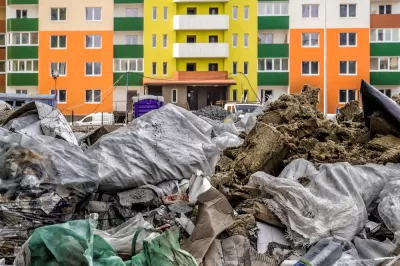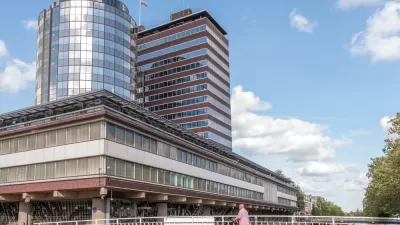Programs that make folks pay for garbage services based on how much they throw away can cut down trash in landfills. Designers are looking for ways to adapt these programs to multiunit buildings.

Policy makers looking to curb waste have had some success with "pay-as-you-throw" schemes, which charge families different amounts for their trash service based on how much waste they produce. One such program in Boulder, Colorado was shown to cut waste to landfills by more than 30%. Now designers are looking to adapt this type of program to multi-unit buildings where it can be much more tricky to tell who is throwing away what and the tragedy of the commons can take hold.
"We think a combination of the right incentives and, yes, trash chute innovations can enable pay-as-you-throw to take hold in apartment buildings — and, over time, improve landfill diversion and recycling rates in cities," Jesse Shapins writes in a Medium post on behalf of Side Walk Talk. In designing for an apartment building, the team had a series of unique challenges to work through, they needed to make something that would identify what apartment was throwing away what garbage without making the residents feel as if their privacy was being invaded.
To test the system, the team created a pilot group and, while they didn't charge the test subjects based on what they threw out, they did apply nudges. "The ultimate goal of a pay-as-you-throw program is to increase recycling rates. In this prototype, we didn’t introduce payment as an incentive, and instead tested simpler behavioral nudges of showing people how much trash they threw away in comparison with neighbors," Shapins writes. The groups tests are not over and the team hopes to continue to scale up to a full building. "We remain focused on the fundamental first step: making trash individually measurable within a multi-family setting," Shapins says.
FULL STORY: We held a one-week design sprint to build a smart trash chute. Here’s what we learned

Alabama: Trump Terminates Settlements for Black Communities Harmed By Raw Sewage
Trump deemed the landmark civil rights agreement “illegal DEI and environmental justice policy.”

Study: Maui’s Plan to Convert Vacation Rentals to Long-Term Housing Could Cause Nearly $1 Billion Economic Loss
The plan would reduce visitor accommodation by 25% resulting in 1,900 jobs lost.

Planetizen Federal Action Tracker
A weekly monitor of how Trump’s orders and actions are impacting planners and planning in America.

Federal Homelessness Agency Places Entire Staff on Leave
The U.S. Interagency Council on Homelessness is the only federal agency dedicated to preventing and ending homelessness.

Restoring Northern India’s Himalayan ‘Water Temples’
Thousands of centuries-old buildings protect the region’s natural springs and serve as community wells and gathering places.

Milwaukee to Double Bike Share Stations
Bublr Bikes, one of the nation’s most successful, will add 500 new e-bikes to its system.
Urban Design for Planners 1: Software Tools
This six-course series explores essential urban design concepts using open source software and equips planners with the tools they need to participate fully in the urban design process.
Planning for Universal Design
Learn the tools for implementing Universal Design in planning regulations.
Caltrans
Smith Gee Studio
Institute for Housing and Urban Development Studies (IHS)
City of Grandview
Harvard GSD Executive Education
Toledo-Lucas County Plan Commissions
Salt Lake City
NYU Wagner Graduate School of Public Service





























